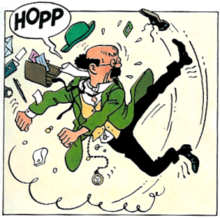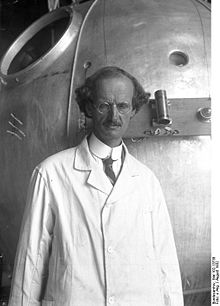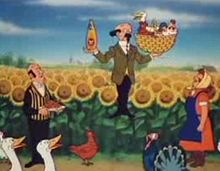- Professor Calculus
-
Professor Calculus 
Professor Calculus (Professeur Tournesol)Publication information Publisher Casterman (Belgium) First appearance Red Rackham's Treasure (1944) Created by Hergé In-story information Full name Cuthbert Calculus Supporting character of Tintin Professor Cuthbert Calculus (Professeur Tryphon Tournesol, literally Professor Tryphonius Sunflower) is a fictional character in The Adventures of Tintin, the series of classic Belgian comic books written and illustrated by Hergé. He is a distracted, hard-of-hearing scientist who invents many sophisticated devices used in the series, such as a one-person shark-shaped submarine, the Moon rocket and an ultrasound weapon.
Calculus first appeared in Red Rackham's Treasure, and was the end result of Hergé's long quest to find the archetypal mad scientist or absent-minded professor. Although Hergé had included characters with similar traits in earlier stories, Calculus developed into a much more complex figure as the series progressed.
Contents
Character history
In short Calculus is a genius, who demonstrates himself throughout the series to be an expert in many fields of science, holding three PhDs in nuclear and theoretical physics, planetary astronomy and calculus. He is also an experienced engineer, archaeologist, biologist and chemist. Many of his inventions precede or mirror similar technological developments in the real world (most notably the Moon rocket, but also his failed attempt at creating a colour television set). He seeks to benefit mankind through his inventions, developing a pill that cures alcoholism by making alcohol unpalatable to the patient, and refusing under great duress to yield his talents to producing weapons of mass destruction. Much of Calculus's more dangerous work is criticized by Captain Haddock, although Calculus usually interprets this the other way round: his deafness often leads him to misinterpret Haddock's words, preventing him from hearing his real opinion.
Calculus's deafness is a frequent source of humour in his interactions with other people, as he often repeats back what he thinks he has heard, usually in the most unlikely words possible. Additionally, he often diverts the subject of a conversation by responding to a misinterpreted remark. For example, "But I never knew you had..." leads Calculus to respond "No, young man, I am not mad!". In the same book he believes that Tintin and Haddock are talking about his sister, before remembering a few moments later that he does not have a sister. He is not perturbed by his handicap, even if it is a source of deep frustration to his friends. He himself does not admit to being near-deaf and insists that he is "only a little hard of hearing in one ear."
In the course of the Moon books, however, Calculus leads a team of scientists and engineers working on a major rocket project, motivating him to adopt an ear trumpet, and later a hearing aid, and for the duration of the adventure he has near-perfect hearing. This made him a more serious character, even displaying leadership qualities which had not been shown before or since. However, after completing the journey to the Moon, Calculus discarded his hearing aid, forcing his friends to readjust to his hearing impairment (aside from one panel in The Castafiore Emerald, when Tintin is seen speaking to him through his ear-trumpet); this restored the humour surrounding him, though it could be that he finds his deafness useful since it enables him to focus on his work.
Calculus maintains a laboratory at Marlinspike Hall, in which he conducts various experiments. He is fairly protective of his work, on occasion hiding his scientific endeavours from Tintin and Haddock (which gets him into trouble in The Calculus Affair). His lab is also stripped of all its apparatus in the same book. On an earlier occasion, during his efforts to find an antidote to Formula Fourteen in Land of Black Gold, Calculus almost destroyed half of Marlinspike in an explosion.
Although generally a mild-mannered (if somewhat oblivious) figure, Calculus flies into an uncharacteristic rage if he feels insulted or ridiculed. He is especially provoked if he ever hears the Captain (or anyone else) call him a "goat". On one famous occasion in Destination Moon, he displays uncontrollable ire ("Goat, am I?") when an irritated Haddock accuses him of "acting the goat" by attempting to build a Moon rocket. His subsequent tirade and blatant disregard for security terrifies the usually ebullient Captain; he even lifts the director of security barring his way onto a coat-hanger. Another occasion is in Flight 714 when, due to some misunderstanding, he physically assaults Laszlo Carreidas and has to be held back with great effort by Haddock and Tintin. In the same book, despite his deafness, he hears Captain Haddock tell him that he's "acting the goat", but Haddock quickly prevents the severe reaction from occurring quickly. Despite his gentle nature, Calculus is rather sensitive about his work and does not appreciate being ridiculed or belittled for his scientific efforts.
In spite of all this, his friends stick by him come what may. Haddock invited him to stay at Marlinspike Hall after Calculus discovered it is the captain's ancestral home and bought it in his name thanks to money he had earned through selling the patent for his shark-submarine. He did this because Haddock and Tintin had provided him with the opportunity to test the submersible when they were searching for Red Rackham's treasure. Tintin and Haddock crossed the world on at least two occasions (Prisoners of the Sun and The Calculus Affair) in order to save him from kidnappers.
He occasionally comments that he was a great sportsman in his youth, with a very athletic lifestyle. He is a former practitioner of the French martial art savate, although a demonstration in Flight 714 shows him to be a bit rusty.
Inspirations
Calculus is partly modeled on inventor Auguste Piccard (1884–1962), Hergé stated in an interview with Numa Sadoul: "Calculus is a reduced scale Piccard, as the real chap was very tall. He had an interminable neck that sprouted from a collar that was much too large... I made Calculus a mini-Piccard, otherwise I would have had to enlarge the frames of the cartoon strip." [1] The Swiss physics professor held a teaching appointment in Brussels when Hergé spotted his unmistakable figure in the street. In The Castafiore Emerald, Bianca Castafiore mentions that Calculus is "famous for his balloon ascensions", an ironic reference to Piccard.
Tintinologist Philippe Goddin has suggested that Calculus' deafness was inspired by Paul Eydt, whom Hergé had known at Le Vingtième Siècle where Tintin's adventures had first appeared.[2] Cuthbert Calculus' original French name is "Tryphon Tournesol" and Tryphon was the name of Hergé's plumber.[2]
In contrast to his unquestionable scientific merits, Calculus is a fervent believer in dowsing, and carries a pendulum for that purpose. Hergé himself was a believer in the subject: dowser Victor Mertens had used a pendulum to find the lost wedding ring of Hergé's wife in October 1939.[2]
Calculus and his peers
Before Calculus appeared in Red Rackham's Treasure, Hergé had featured other highly-educated but eccentric scholars and scientists, such as:
- Dr. Sarcophagus of Cigars of the Pharaoh who showed signs of being clumsy and forgetful before going completely mad.
- The absent-minded professor who appeared in The Broken Ear and who forgot his glasses, wore his cleaning-lady's overcoat, held his cane upside-down as if it were an umbrella, mistook a parrot for a man and left his briefcase next to a lamp post. (In the original edition published in 1935 his name is given as Professor Euclide, after the Greek mathematician known as the "Father of Geometry".)
- Professor Hector Alembick in King Ottokar's Sceptre, who had a bad habit of throwing his cigarettes on the floor.
- Two astronomers from The Shooting Star also showed unusual and, in one case, mad behaviour: Philippulus the Prophet represented the dilemmas some face over religious belief and scientific research. In his case the conflict took a toll on his mind when the end-of-the-world appeared to be imminent. He then went around wearing bedsheets and beating a gong to warn of the event and later disrupted the eve of departure of the expedition sent to find a meteorite.
- His colleague, Professor Decimus Phostle, though not mad, looked forward to the end of the world whose prediction he thought would make him famous. In contrast, he showed signs of maturity during the expedition when he called off the search for the meteorite in order to help a ship in distress.
Calculus's introduction appears to have supplied Hergé with the bizarre nature he wished to portray in a man of science. Other figures of high education were shown as more stable and level-headed. The members of the archaeological expedition who fall victim to The Seven Crystal Balls show no apparent signs of eccentricity. The most prominent member of this group is Calculus's friend Hercules Tarragon, with whom he attended university. Tarragon is a large, ebullient man, possessing a jovial nature, but not necessarily eccentric.
While he sometimes appears aloof when absorbed in his work, Calculus corresponds with other scientists and also collaborates with many of them on his projects. Notably, he works with Baxter and Frank Wolff on the Moon rocket and corresponds with ultrasonics expert Alfredo Topolino of Nyon in The Calculus Affair.
Relationship to women
Calculus is the only regular character in the Tintin series to display signs of attraction to women. This is notably evident in his interactions with Bianca Castafiore, with whom he is smitten during her long stay at Marlinspike Hall in The Castafiore Emerald. During her stay, his botanic experiments lead him to create a new variety of rose, which he names in her honour. Nonetheless, he happily congratulates Captain Haddock on his "engagement" to Castafiore (in fact a media hoax which he unwittingly fuelled).
Calculus is also distressed by Castafiore's imprisonment in Tintin and the Picaros, and is adamant on going to her defence. In the same book, he is charmed by the unattractive Peggy Alcazar (wife of General Alcazar) and kisses her hand after she bluntly criticizes Tintin and Haddock (a remark which Calculus mistakes for a warm greeting).
In other media
Calculus' original French name was "Tournesol" which is the French term for sunflower. In the 1970s and 1980s, he starred in a series of cartoon television commercials for Fruit d'or products which included cooking oil and mayonnaise made from sunflower oil. Some of the ads would conclude with him floating up into the air to demonstrate how they kept a good healthy balance. Other characters from the books were also included.[1]
His name was used in naming an album by Stephen Duffy and the group Tin Tin, which was called "Dr. Calculus".
Names in other languages
- Afrikaans: Professor Tertius Phosfatus
- Arabic: Professor Bargal
- Basque: Turnesol
- Brazilian Portuguese: Professor Girassol
- Catalan: Silvestre Tornassol
- Czech: Profesor Tryfon Hluchavka
- Danish: Professor Tournesol
- Dutch: Professor Trifonius Zonnebloem (meaning Sunflower)
- Finnish: Professori Teophilus Tuhatkauno
- German: Balduin Bienlein
- Greek: Καθηγητής Κάλκιουλούς or Τουρνεσόλ depending on the edition.
- Icelandic: Prófessor Vilhjálmur Vandráður
- Indonesia: Profesor Kalkulus, Profesor Lionel Lakmus (New Edition)
- Italian: Professor Girasole
- Japanese: Professor Beaker
- Persian: Professor Tournesol (پروفسور تورنسل)
- Polish: Profesor Lakmus
- Portuguese: Trifólio Girassol (Pintadinho in older editions)
- Spanish: Silvestre Tornasol
- Swedish: Professor Karl Kalkyl
- Turkish: Profesör Turnusol
See also
References
- ^ Horeau, Yves The Adventures of Tintin at Sea 1999, English translation 2004 for the National Maritime Museum, published by John Maurray, ISBN 0719561191. Chapter on Outside characters drawn into the Adventures.
- ^ a b c A la recherche du trésor de Rackham le Rouge (French for "In Search of Red Rackham's Treasure") by Hergé, with comments by Daniel Couvreur and Frédéric Soumois, published by Editions Moulinsart in November 2007, ISBN 978-2874241604
Categories:- Comics characters introduced in 1944
- Tintin characters
- Fictional deaf characters
- Fictional savateurs
- Fictional inventors
- Fictional professors
- Fictional scientists
- Advertising characters
Wikimedia Foundation. 2010.



